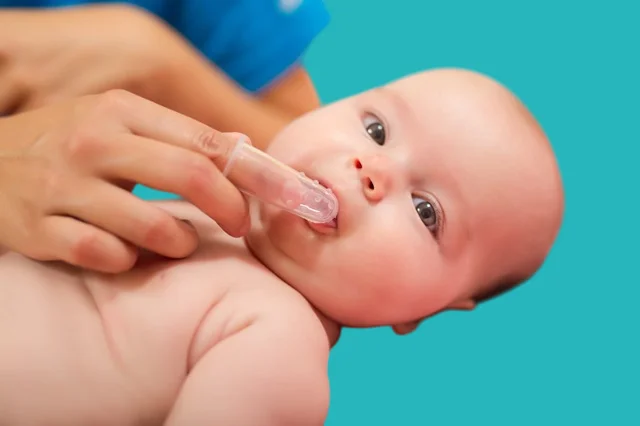Teething in infants is a natural stage where the baby teeth begin to erupt, followed by the upper teeth, and then the incisors and molars.
However, this stage can be tiring and uncomfortable for both the baby and the mother due to the intensity of its symptoms. In this article, you will learn about the symptoms of teething, its treatment, and how to care for your baby during this period.
What is teething in infants
Teething in infants is the gradual eruption of the baby teeth through the gums. Teething typically begins around 6 months of age, but this can vary from child to child.
Symptoms of teething in infants

Symptoms appear gradually and vary in severity. They usually begin a few days before the teeth erupt and include:
- Excessive drooling.
- Redness and swelling of the gums.
- Refusal to feed and loss of appetite.
- A slight increase in temperature.
- Constant crying without an apparent reason.
- Rubbing the cheek or ear due to gum pain.
- Increased desire to chew on objects.
- Difficulty sleeping and frequent nighttime awakenings.
The appearance of a baby's gums during teething
There are several signs that appear on the gums indicating that the baby is teething, including:
- Swelling and puffiness of the gums where the teeth are erupting.
- The gums become harder compared to the rest of the gums.
- White spots appear under the gum skin.
- Redness at the teething site.
When should you see a doctor
You should see a doctor during teething if your baby's temperature rises above 38.5 degrees Celsius or if they experience frequent diarrhea and vomiting.
Also, if your baby refuses food or breastfeeding for an extended period, cries excessively, has bleeding or pus on their gums, or if teeth haven't erupted by the age of one.
Ways to treat teething pain in babies
There are several ways to relieve teething pain in babies, including:
- Gently massaging the gums.
- Using cold teething toys.
- Giving the baby pain reliever.
- Offering cold fruit and vegetable slices.
- Applying cold compresses to the baby's gums.
Teething Medications for Infants
These medications are used to relieve pain in infants, but should only be prescribed by a doctor or pharmacist to determine the appropriate treatment based on the child's age:
- Paramol Syrup
- Cetyl Syrup
- Ibuprofen Syrup
- Gingi Teething Gel
Tips for Mothers to Deal with Teething

Teething is known to be painful for babies and tiring for mothers. Therefore, there are some tips mothers can follow to alleviate pain and soothe their babies, such as:
- Trying to stay close to the baby to make them feel cared for.
- Avoid giving them any medication without consulting a doctor.
- Massaging the baby's gums regularly.
- Wiping the baby's drool.
Frequently Asked Questions about Teething in Infants
What is the most difficult stage of teething
The most difficult stage of teething is the eruption of the molars at 2-3 years of age, followed by the eruption of the upper and lower incisors at 4-6 months of age.
How do you know your baby's teeth have started to erupt
If you notice swelling and redness of the front gums, along with the appearance of small white spots and increased drooling in your baby
Are teething gums hard or soft
Gums are hard during teething, especially in the area where the teeth are erupting.
When do babies start teething
Babies typically start teething between 6 and 12 months of age, although this period may be earlier or later depending on each child.
Article Summary
Teething is a natural stage in a baby's development, but its symptoms can be uncomfortable and slightly painful. However, these symptoms can be soothed and relieved.
Therefore, mothers should be well-informed and understanding of how to care for their baby during this stage, providing comfort and security.